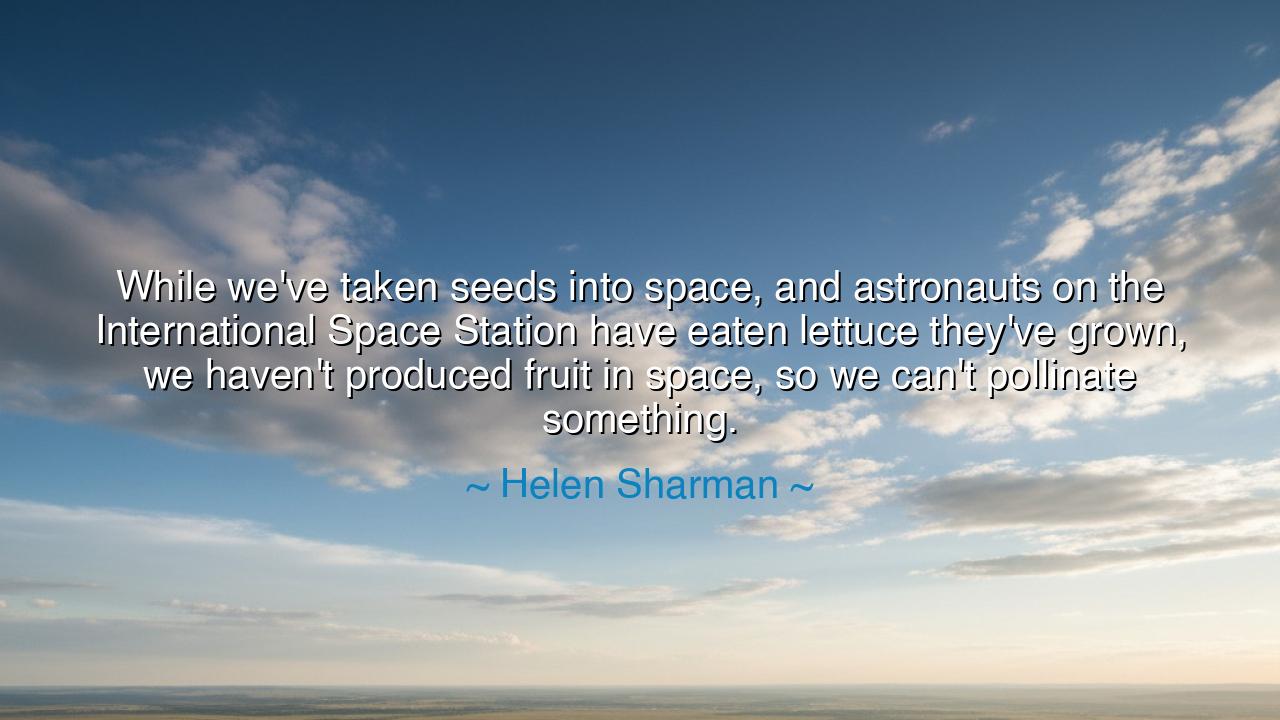
While we've taken seeds into space, and astronauts on the
While we've taken seeds into space, and astronauts on the International Space Station have eaten lettuce they've grown, we haven't produced fruit in space, so we can't pollinate something.






"While we've taken seeds into space, and astronauts on the International Space Station have eaten lettuce they've grown, we haven't produced fruit in space, so we can't pollinate something." — these words from Helen Sharman, the first British astronaut to visit the International Space Station, speak to the complexity and fragility of human existence as we venture beyond the familiar confines of Earth. Sharman’s insight is not merely about the technicalities of space farming but a deeper metaphor about growth, nourishment, and the interdependence required for something to truly flourish. While humanity has achieved remarkable feats in space—taking seeds into the void, growing crops, and even eating the fruits of our labor—there is still something missing from the equation: the full cycle of life, symbolized in the pollination that is necessary for fruit-bearing.
In the ancient world, the idea of growth was deeply intertwined with the sacred rhythms of nature. The Greeks and Romans celebrated the seasons and the cycles of life and death. They understood that every plant, every tree, and every harvest had its place in the grand web of existence. The myth of Demeter, the goddess of the harvest, for example, tells of her grief when her daughter Persephone was taken to the underworld, causing the earth to grow barren. It was not just the earth’s surface that was affected, but the very cycles of life that depended on the interconnectedness of nature. The pollination of plants was a sacred act, essential for the continuation of life on Earth. Just as Demeter’s loss brought drought, so too did the absence of pollination in space leave us incomplete in our ability to sustain life off Earth.
Sharman’s words point to the remarkable achievement of human ingenuity—the ability to grow lettuce in space, providing food for astronauts in the isolated environment of the International Space Station. Yet, as she notes, fruit—the more complex product of nature—remains elusive. The challenge of pollination, of the intricate dance between plants, insects, and the environment, is not easily replicated in a controlled environment like the ISS. In the great expanse of space, the elements that we rely on for growth—bees, wind, and the natural rhythm of day and night—are absent. Thus, while we have made strides in growing food in space, we are reminded that true sustainability requires more than just the basic act of planting; it requires the full interdependence of life to ensure a healthy, flourishing system.
This challenge is not unlike the story of early agriculture here on Earth, when our ancestors began to tame the wild land, planting seeds and cultivating crops for the first time. These early agriculturalists faced an even more mysterious challenge: learning how to coax life from the earth, understanding the cycles of planting, pollination, and harvest. Early farmers understood that growth was not simply a mechanical process; it was an act of patience, of observing nature, of working in harmony with the rhythms of life. Without the careful interplay of sunlight, water, and the delicate balance of ecosystems, the plants would not thrive. In this way, Sharman’s quote is a reminder that, as we venture into new frontiers, we must not forget the complexity and delicacy of the systems we are trying to replicate and sustain.
In modern times, we have made incredible advancements in space technology and agriculture. NASA has managed to grow a variety of crops aboard the International Space Station, including lettuce, radishes, and even zinnias. However, the inability to create a complete, self-sustaining ecosystem—one in which fruits can be pollinated and thrive—reveals the limitations we still face. We may have planted the seeds of the future, but without the full interconnectedness of nature, we are not yet capable of achieving the ultimate goal: a truly sustainable and self-sufficient life in space. The absence of pollination is a clear reminder that the complexity of life is far beyond our current understanding, and it is a task we must continue to study and explore.
Sharman’s words also hold a deeper lesson for us on Earth. In our lives, we often focus on achieving individual successes or isolated goals, yet we forget that true growth—whether in our relationships, our work, or our personal lives—requires more than just isolated efforts. It requires the interdependence of all things. The fruit cannot grow without the pollination—the care, the connections, and the effort of those around us. In seeking to grow, whether it is knowledge, career, or family, we must recognize that our individual actions must be part of a greater cycle, one in which all things work together in balance. This is the lesson of nature, one that has been evident for centuries and is just as true in our modern lives as it is in the growth of a plant or a community.
The ultimate lesson in Sharman’s statement is that we must seek balance in all things. Whether we are embarking on the great adventure of space exploration or striving to grow as individuals, we must understand that growth is not simply about taking one step forward. True growth requires the full cycle—the planting, the nurturing, and the interactions that support us in every aspect of life. Just as fruit cannot grow in space without the pollination process, so too can we not grow without the support of the world around us, without the balance of community, nature, and purpose. Only in this way can we truly achieve sustainable growth—whether in space or on Earth. Let us strive to create ecosystems in our lives that are not just functional, but thriving, interconnected, and whole.






AAdministratorAdministrator
Welcome, honored guests. Please leave a comment, we will respond soon